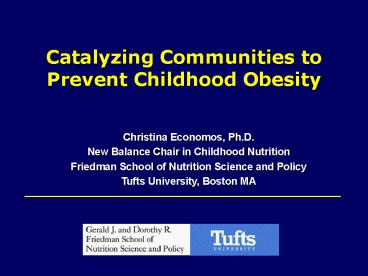Catalyzing Communities to Prevent Childhood Obesity - PowerPoint PPT Presentation
1 / 24
Title:
Catalyzing Communities to Prevent Childhood Obesity
Description:
Catalyzing Communities to Prevent Childhood Obesity. Christina Economos, Ph.D. ... Proactive strategies required to prevent childhood obesity ... – PowerPoint PPT presentation
Number of Views:53
Avg rating:3.0/5.0
Title: Catalyzing Communities to Prevent Childhood Obesity
1
Catalyzing Communities to Prevent Childhood
Obesity
Christina Economos, Ph.D. New Balance Chair in
Childhood Nutrition Friedman School of Nutrition
Science and Policy Tufts University, Boston MA
2
BACKGROUND
- Proactive strategies required to prevent
childhood obesity - Individual behaviors must be addressed in the
context of societal and environmental influences - Most prevention studies target school
environments - Summer weight change recently shown to outpace
expected gains with growth and development - Community-based interventions that have a
theoretical framework and are mutli-level and
participatory in nature are needed
3
How do you spark social change?
- Learn from other movements (tobacco, recycling,
seat belts, breastfeeding) - Call for a Crisis
- Build on a sound scientific base
- Nurture spark plugs
- Recognize the importance of economics
- Develop coalitions and advocacy
- Use government strategically
- Employ mass communication
- Create environmental and policy changes
- Develop a clear plan
Economos, C, Brownson, S, DeAngelis, M, Foerster,
S, Tucker Foreman, C, Kumanyika, S, Pate R. What
Lessons Have Been Learned From Other Attempts To
Guide Social Change? Nutrition Reviews 2001
59(3)40-56
4
What can we do? Theres strength in numbers!
Work in Communities
Source Institute of Medicine, Preventing
Childhood Obesity Health in the Balance, 2005
5
Shape Up Somerville Eat Smart. Play Hard.
- A community-based, participatory, environmental
approach to prevent childhood obesity - A 3 year controlled trial to study 1st 3rd
grade culturally and ethnically diverse children
and their parents from 3 cities outside Boston - Goals
- To examine the effectiveness of the model on the
prevention of undesirable weight gain in children - Transform a community and inform social change at
the national level
R06/CCR121519-01 from the Centers for Disease
Control and Prevention. Additional support by
Blue Cross Blue Shield of Massachusetts, United
Way of Mass Bay, The US Potato Board, Stonyfield
Farm, and Dole Foods
6
Community Engagement Model
Perform environmental assessments
Hold community meetings
Community Mapping Understanding connections
Identify champions
Listen Build Relationships Establish Trust
Conduct focus groups key informant interviews
Participation Assessment Identifying partners
Information Gathering Delivery
Employ The Social Change Model of Leadership
Development
Capacity Building Making it happen
Community council formation
Capitalize on social injustices
Logo and brand development
Identify the problem as a community priority
Model Adapted from National Resources Canada
7
Study Timeline
Post School Year 1 Measurement May 04
Post School Year 2 Measurement May 05
Pre School Year 2 Measurement Sept 04
Baseline Pre School Year 1 Measurement Oct 03
Summer
Planning and monitoring year Oct 02-Sept 03
Year 1 Intervention Oct 03-Sept 04
Year 2 Intervention Oct 04-Sept 05
8
Baseline Overweight Prevalence
At risk ? 85th to lt 95th percentile Overweight
? 95th percentile Reference CDC 2000
Ogden JAMA 2006, Economos, 2003
9
INTERVENTION
- Designed to increase energy expenditure (EE) of
up to 125 kcals per day beyond the increases in
EE and energy intake that accompany growth - Variety of increased opportunities for physical
activity - lt 2 hr. per day of Screen Time, No TV in bedroom
- Increased availability of foods of lower energy
density, emphasizing fruits, vegetables, whole
grains, and low-fat dairy - Foods high in fat and sugar were discouraged
- Family Meals encouraged structure, modeling,
education, emotional connection practice as
often as possible - Multi-level approach
- Before, during, after school, home, community
10
Home Parent, Child, Family
School Child, teachers, administration, staff
(25 kcals)
School Child, teachers, administration, staff
School Child, teachers, administration, staff
Home Parent, Child, Family
Community After school programs
Community Ethnic groups
Home Parent, Child, Family
Health Care System
Local Government
Community Restaurants
Media
11
Skills Development
12
Experiential Learning
13
Demonstrations
14
A La Carte Options Before Shape Up.
15
AfterImproved A La Carte Options
16
HEAT Club After School Program
17
Before school Walking School Bus
18
Support from Community Champions
- A year of consultation and guidance for being a
visible role model - Mayor Joe Curtatone
- Aldermen
- School Committee
- Members
19
Growing food, knowing food School Gardens and
Nutrition Education
20
Shape Up Somerville Results
- Engaged 90 teachers in 100 of 1-3 grade
classrooms (N81) - Participated in or conducted 100 community events
and 4 parent forums - Trained 50 medical professionals
- Recruited 21 restaurants
- Reached 811 families through 9 parent
newsletters, and 353 community partners through 6
community newsletters - Reached over 20,000 through a monthly media piece
(11 months) - Recruited all 14 after-school programs
- Developed community-wide policies to promote and
sustain change
21
First Year Results
Economos C, Hyatt R, Goldberg J, Must A, Naumova
E, Collins J, Nelson M. A Community-Based
Environmental Change Intervention Reduces BMI
z-Score in Children Shape Up Somerville First
Year Results. Obesity. 2007151325-1326.
22
Results Pre-Post Summer BMI z-score
N1120
23
Implications / Future Directions
- Comprehensive strategies with changes in multiple
environments reinforced with policies that ensure
healthy living are a viable and necessary
direction for the future - Nurture coalitions build on wellness policies
- Change takes time
- Stay informed and educated
- Connect schools with healthcare
- Create policies, mandates, laws
- Get leadership on board
24
Beyond Somerville
- Replicating the intervention across the country
through a RCT with 6 urban communities. The
BALANCE Project - Adapting and implementing the intervention
through a RCT in 8 communities in rural America
(CA, MS, KY, SC) with Save the Children. The
CHANGE Project - Distributing the HEAT Club after school
curriculum through live and online trainings
throughout the U.S. (gt200 ASPs in 20 states)
including a RCT - Expanding the work to target new immigrants
through a new NIH grant (CBPR) - www.childreninbalance.org































